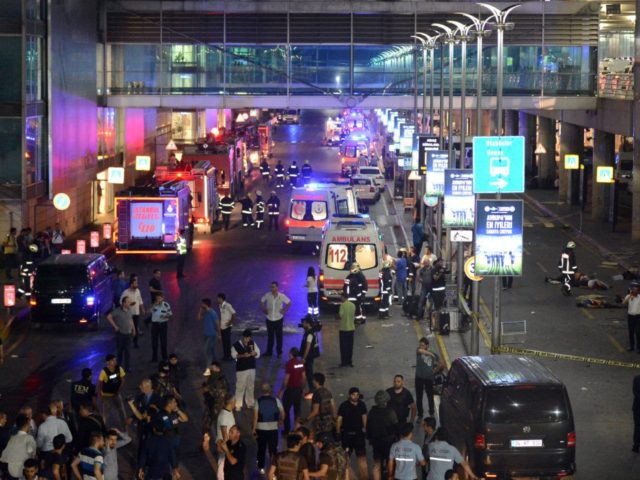Tuesday’s multiple suicide bombings in Istanbul’s Ataturk airport have proven to be the bloodiest attack this year by Islamic jihadists on Turkish soil, leaving 42 dead of at least ten different nationalities and another 239 injured.
New revelations suggest that the first of the three suicide bombers acted as a sort of “battering ram” for the other two, blowing himself up outside the terminal and creating chaos that has enabled the other two bombers to enter.
A second bomber blew himself up in the departures area, while the third detonated his explosives in the arrivals hall.
Police are also reporting that besides the bombers, at least four other people were directly involved in the attacks. One of the four—a woman—was arrested Wednesday night.
Analysts have leveled sharp criticism at Turkish security, alleging that authorities had prior warning some 20 days before the attack warning that Ataturk Airport—Europe’s third largest airport—was on the short list of Islamic State terror targets for an imminent attack.
“There is an attempt to turn our security forces into guilty parties, but they will not succeed in their efforts because this nation knows full well who is who,” said Turkish President Recep Tayyip Erdogan in response Wednesday. “We will never forget our martyrs.”
The assault is the latest in a wave of lethal Islamic violence that has taken place during the month-long Islamic holy season of Ramadan, apparently in response to urging from the Islamic State to commemorate the feast through deadly jihad.
The Islamic State released a video on May 21 urging Muslims in the United States and Europe to carry out terror attacks during what a group spokesman promised would be “the month of conquest and jihad.”
Islam’s month of Ramadan began on June 5 this year and will finish the evening of July 5. Muslims believe it was during this month that Allah revealed the first verses of the Qur’an to Mohammed, on a night known as “The Night of Power.”
Since Ramadan began, Islamic terrorists have perpetrated attacks in Orlando, Afghanistan, Kenya, Lebanon and now Istanbul, Turkey.
In the ISIS video calling for such attacks, spokesman Abu Mohammad al-Adnani urged jihadists to “get prepared, be ready … to make it a month of calamity everywhere for nonbelievers… especially for the fighters and supporters of the caliphate in Europe and America.”
A report issued by the US-led Overseas Security Advisory Council warned that the ISIS threat could be credible because of the religious motivation to sacrifice oneself during this sacred time.
“According to Islamic practice, sacrifice during Ramadan can be considered more valuable than that made at other times, so a call to martyrdom during the month may hold a special allure to some,” the report stated.
Follow Thomas D. Williams on Twitter Follow @tdwilliamsrome

COMMENTS
Please let us know if you're having issues with commenting.